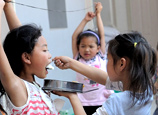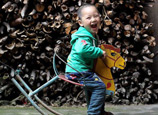
YINCHUAN, May 31 (Xinhua) -- Ma Mei is considering buying an iPad for her three-year-old daughter as a gift for International Children's Day, which falls on Saturday. But the child's grandmother has objected, saying she should spend more time outdoors instead of playing with a tablet.
"I played a lot of traditional games with my friends when I was a child, such as hide-and-seek and skipping rope. The games were simple and fun. But the times change, iPads and iPhones are popular now and my daughter likes them," said Ma, an editor of a Beijing-based magazine.
Ma said her daughter likes to play with her iPhone, "but the screen is too small, I want to buy an iPad for her. It might be better for her eyes."
"I cannot agree. I saw my granddaughter sitting on the sofa and fixing her eyes on the iPhone before. I wish she would play games and communicate with her peers instead of being isolated at home," the child's grandmother You Xinling said.
Ling Yan, who lives in northwest China's Ningxia Hui Autonomous Region, said she often sees children playing games on their mobile devices when out in public.
Her 11-year-old daughter is a big fan of mobile games as well. "She cajoles her father and I to lend her our iPad to play with every day after school," Ling said.
"I want to take her to participate in some outdoor activities during weekends, but she doesn't like to go out and shows no interest in playing with others," Ling said.
"With video games becoming more popular, traditional entertainment seen in the 1980s and 1990s has disappeared. People rarely see children playing old-fashioned games anymore," said Guo Hu, director of the Ningxia regional educational department.
"A growing number of children are playing games on mobile devices like iPads and PSPs, leading some to call them the 'iPad Generation'," Guo said.
Education experts and organizations are still encouraging children to enjoy traditional games in order to develop their intelligence and improve their communication skills, Guo said.
Four kindergartens in Ningxia have been trying to repopularize traditional games since 2011. Another three kindergartens have joined their cause. However, their attempts have not gone smoothly.
The No. 4 Kindergarten in the regional capital of Ningxia has collected 121 traditional games since 2011. However, not all the children have welcomed them.
"I like those games, but I don't have them at home and no one will play with me after school, so I play computer games at home instead," said Cao Yuheng, a student at the kindergarten.
Huang Ying, a researcher from the education department of Yinchuan's Xingqing District, said fierce competition in schools has led parents to make every effort to enroll their children in extracurricular classes, leaving them little time to play with their peers.
"Children get too much homework and pressure from both parents and teachers. They don't have time or energy to play old-fashioned games," Huang said.
Huang added that modern urban living has also had an effect, as children live in impersonal, disconnected communities that make it difficult for them to foster friendships with their peers.
In addition, many schools have cancelled exercise activities due to safety considerations, leading some students to turn their interests toward computer games.
"Children do like traditional games, but some parents favor 'electronic babysitters' when they're too busy. Parents need to take more time to play outdoors with their children," said Chai Lei, a local kindergarten teacher.
















 Learning to be a perfect lady proves fruitful
Learning to be a perfect lady proves fruitful


![]()
